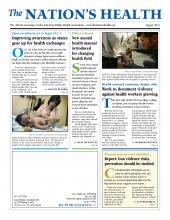As a senior, you may have a whole new world open up to you that includes traveling and grandchildren to keep you young at heart.
But aging is not always easy. Aging means accepting that your body is going through some changes. That’s why it’s important to be even more vigilant about staying healthy, and take measures that can prevent some of aging’s pitfalls, such as loss of balance, vision and hearing.
Your memory can be an unfortunate casualty of aging. There are as many as 5.1 million Americans living with Alzheimer’s, a degenerative brain disease, according to the National Institute on Aging.
The institute conducts research on ways to avoid memory loss, says Marie A. Bernard, MD, deputy director of the institute and a geriatrician. But Bernard says there are healthy habits that could help with retaining memory, such as being physically active, keeping weight down, getting adequate amounts of sleep and eating a reasonable diet.
Seniors should make sure they have a diet balanced in carbohydrates, proteins and fats. As the body changes, so does the appetite, Bernard says. Seniors particularly need to be aware of getting the necessary amount of protein because changes in appetite mean they no longer get enough.

Photos courtesy iStockphoto: Yoga class by Willie Thomas
To achieve balance, seniors should eat three meals per day that include several servings of vegetables and fruits, fish and white meats such as chicken, Bernard says. Your diet should also be rich in calcium to slow bone loss. While many measures to prevent bone loss should ideally be done before age 30, seniors should still eat calcium-rich foods such as leafy vegetables and dairy products.
“Some older individuals find it’s difficult to take in three meals a day,” Bernard says. “They get full very rapidly, so four or five smaller meals but getting in essence the equivalent of those two to three plates per day can suffice.”
Take care with medications
Seniors should also take precautions when it comes to medications. Every physician a senior has should be up to date on what medication she or he is taking. Patients should come prepared to doctor appointments with a list of their prescriptions and the recommended dosage, Bernard says. Even more caution should be used with herbal supplements or over-the-counter medicines because they could potentially mix badly with prescribed medications, Bernard says.
“You should not just willy-nilly take something over the counter without your physicians knowing what it is that you’re taking and letting you know whether there are potential interactions and side effects associated with that,” Bernard says. “Your pharmacist can be helpful with that as well.”
Watch the way you walk
With age also comes a lack of balance. Something as simple as tripping over a sidewalk could lead to a fall that results in a bone fracture. Your feet may not be the only cause of your fall. Underlying causes to your lack of balance could come from problems with your vision and hearing, too, Bernard says.
Bernard says people in their 50s should start seeing health care providers regularly for vision and hearing tests. Doing so can help prevent ailments such as cataracts and glaucoma, which many people develop as they get older.
When it comes to your feet, Bernard says that as you age, you lose the fat under your skin that supports the bones in your feet, leaving you prone to more injuries. Women in particular can no longer wear shoes such as high heels as they did in their 20s and 30s, Bernard says.
“Wearing shoes with good support, generally flat shoes, will be important to maintain the health of the feet and also decrease your risk for falls,” she says.
The health of your feet and your relationship with your health care provider become that much more crucial to maintaining balance as a senior with diabetes, Bernard says.
Seniors with diabetes may have different sensations in their feet and be unaware of where their feet are placed, increasing the risk for falls.
“There’s some really nice research that suggest exercises working on balance like tai chi and yoga can help individuals decrease their risk,” Bernard says. “They tend to be gentle forms of exercise that people of very advanced ages can get involved with.”
Exercise your way to health
Exercise and being generally active are the keys to preventing many ailments that mark the aging process. Bernard says getting outside and walking is good for older adults because it increases aerobic ability and strengthens the heart and the legs. Regular exercise, for example, can help with slowing bone loss in your legs and hips, she says.
Strengthening exercises, such as lifting small weights, are also beneficial to making tasks such as going from your bed to a chair easier, according to Bernard.
- Copyright The Nation’s Health, American Public Health Association









